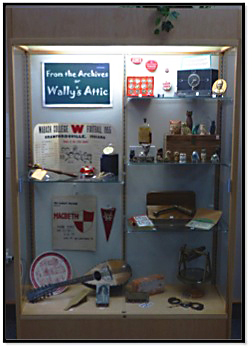 One of the best parts of the work here in the Archives is the creation of exhibits on the main floor of the Lilly Library. The latest exhibit just came together and it is full of fun and interesting bits of the history of this great place. Here are a few quick stories of some of these interesting items.
One of the best parts of the work here in the Archives is the creation of exhibits on the main floor of the Lilly Library. The latest exhibit just came together and it is full of fun and interesting bits of the history of this great place. Here are a few quick stories of some of these interesting items.
Also on display is the crank used to wind the Milligan Clock. Mounted and presented to President Ford by the head of campus services, Tom Marotta, the crank was no longer needed following renovation.
A pair of handcuffs and a constable’s badge from our sizable horse Thief Detective collection adds a little law and order to the exhibit. Librarian and archivist Don Thompson amassed quite a collection of documents and artifacts relating to the history of this legally sanctioned vigilante organization.
A brick and a letter slot from Kingery Hall are the last remnants of that old building, destroyed in the Good Friday tornado of 2006. Built as a home for the preparatory and Normal schools, Kingery was constructed from bricks fired on this site in the 1850’s.
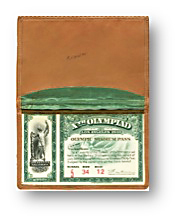 There is a stadium pass to the 1932 Los Angeles Olympics held in the brand new Coliseum. Among the 100,000 spectators was Will H. Hays, Jr. [W1937] – known to generations of Wabash men as Bill. It is a beautiful document and still in mint condition.
There is a stadium pass to the 1932 Los Angeles Olympics held in the brand new Coliseum. Among the 100,000 spectators was Will H. Hays, Jr. [W1937] – known to generations of Wabash men as Bill. It is a beautiful document and still in mint condition.
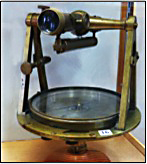 A surveying transit, built by Wabash man John S. Hougham [W1846] who, as a student, helped to found the Beta Theta Pi fraternity. Hougham was a scientist who built high quality scientific instruments as a supplement to his salary as professor at Franklin College. Hougham taught for some years at the Kansas State Agricultural College until he was called to be the first member of the faculty and interim president of Purdue. This transit was a gift from David Ingram, a collector of historic land surveying instruments, and the father of Dr. Amanda Ingram who teaches biology at Wabash.
A surveying transit, built by Wabash man John S. Hougham [W1846] who, as a student, helped to found the Beta Theta Pi fraternity. Hougham was a scientist who built high quality scientific instruments as a supplement to his salary as professor at Franklin College. Hougham taught for some years at the Kansas State Agricultural College until he was called to be the first member of the faculty and interim president of Purdue. This transit was a gift from David Ingram, a collector of historic land surveying instruments, and the father of Dr. Amanda Ingram who teaches biology at Wabash.
One of the smallest items is a campaign button from the 1964 Governor’s race. Dick Ristine was Lt. Governor of Indiana and running for the top spot. A republican in a largely republican state, you might think that Ristine was a shoe-in to win and yet he did not. An article in the Indiana Historical Society’s magazine, Traces, “For the Betterment of Indiana: Lieutenant Governor Richard O. Ristine,” by Geoff Paddock explains the loss eloquently. It seems that the state was in dire financial straits and needed to pass a 2% sales tax. A part of the Lt. Governor’s duties, like those of the Vice-President of the United States, is to vote in the event of a tie. The sales tax legislation came down to a tie vote, it was up to Dick to break it. Indiana needed this legislation, but it would be political suicide. Still, it was never part of Dick’s makeup to dodge the hard choices, so he cast the tie-breaking vote to enact the state sales tax. Dick never made it to the governor’s chair, but he held firm to his principles.
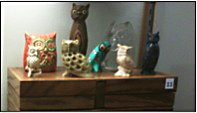 One shelf in the case is occupied by Bill Placher’s owl collection. Owls, large and small, in a variety of colors made from all sorts of materials. This photo shows just a portion of the collection.
One shelf in the case is occupied by Bill Placher’s owl collection. Owls, large and small, in a variety of colors made from all sorts of materials. This photo shows just a portion of the collection.
I love them all lined up, wise guys watching over the library.
A wedding present to a student and his bride reminds us of the rest of the story about our tycoon president. On a whim, Moses Brand [W1957] invited President and Mrs. Sparks to his wedding and while they could not make it, they sent along this radio as their present. Before becoming president of Wabash, Frank Hugh Sparks had 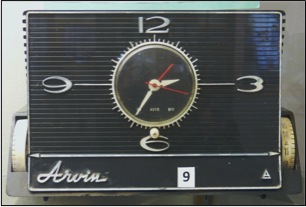 founded the Noblitt-Sparks company and made a fortune. Having achieved his dream of becoming a millionaire – when a million dollars was really worth something – he turned to another dream. Sparks wanted to be the president of a college, but was told that to be considered for such a post he would have to have a Ph.D. This was a larger problem than might first appear since Sparks had never gone to college. Undaunted, he enrolled at Butler as a middle aged man, graduated and then went to U.S.C. for his doctorate. All the while his company was doing quite well and had acquired the Arvin Company. One of the product lines was small, high quality countertop radios. This was Sparks’ gift to the newlyweds and this radio, a wonderful gift to a couple just starting out, served every day for many years in the kitchen of this Wabash man and his bride.
founded the Noblitt-Sparks company and made a fortune. Having achieved his dream of becoming a millionaire – when a million dollars was really worth something – he turned to another dream. Sparks wanted to be the president of a college, but was told that to be considered for such a post he would have to have a Ph.D. This was a larger problem than might first appear since Sparks had never gone to college. Undaunted, he enrolled at Butler as a middle aged man, graduated and then went to U.S.C. for his doctorate. All the while his company was doing quite well and had acquired the Arvin Company. One of the product lines was small, high quality countertop radios. This was Sparks’ gift to the newlyweds and this radio, a wonderful gift to a couple just starting out, served every day for many years in the kitchen of this Wabash man and his bride.
These are just a few of the back stories of the two dozen artifacts now on display in the Lilly Library. And these two dozen artifacts are but a few of the thousands of items in the Ramsay Archives, also known as Wally’s Attic.